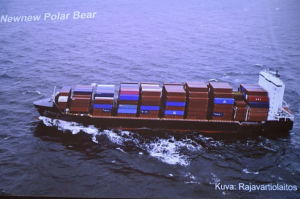HELSINKI:
Finnish police said on Tuesday that it was too soon to say if a ship dragging a massive anchor down the seabed earlier this month was responsible for damage to a Baltic Sea gas pipeline.

They claimed they found an anchor on the seafloor near where the pipeline burst on October 8 and were trying to determine if it belonged to a Chinese container ship.
The Balticconnector underwater gas pipeline and two Baltic Sea telecoms cables were damaged by an external mechanical force, which police have previously claimed they are examining as possible sabotage or accidental damage.
There were large drag marks on the seafloor leading up to where the pipeline was damaged, and the anchor was resting just after the point of impact. According to the police, a narrower route could be spotted on the seafloor continuing on for hundreds of kilometers.
They also mentioned that one of the anchor’s two spikes had broken off.
“The next questions are about whether it was intentional, negligence, poor seamanship, and that’s where we get into whether there could be a motive for what’s going on,” National Bureau of Investigation (NBI) director Robin Lardot said at a press conference.
“But it’s too early to answer that at this stage,” he continued.
On Friday, the NBI announced that the container ship Chinese NewNew Polar Bear, which was traveling above the pipeline and the cables at the time of the damage, will be the primary focus of their investigation.
On Tuesday, the NBI reported that they had confirmed the NewNew Polar Bear was missing one of its front anchors and tried unsuccessfully to get in touch with the vessel to confirm whether or not this was the anchor recovered in the Gulf of Finland.
On Monday, China demanded a probe into the pipeline explosion be conducted in a “objective, fair, and professional” manner.
Pipeline gas supplies to Finland were disrupted, but the country is prepared to make do with liquefied natural gas imports via ship delivery to its Inkoo port.
Damage has prompted NATO to increase patrols in the Baltic Sea.
Although the perpetrators of the September 2022 explosions that damaged the larger Nord Stream pipelines between Germany and Russia remain unknown, it is widely believed that these were acts of purposeful sabotage.









































